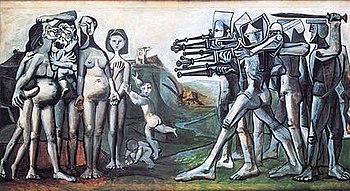WWIII – Already begun in 1972?
Terrorism, in its modern form, as we know it began 5 September 1972 – using intentional violence and fear to illustrate political or ideological aims. With it came also the growth of dictators who use the same methods. WWIII? It can be said that WWI, with a broad brush stroke was a dynastic world war and one for the conquest or retention of territory. As humans it required not the assent of any party. There were patriots on both sides of the warring parties but for the rest of the world it did not engage fundamentals of what it is to be human. The other world war, WWII, was not about territory, it was also not dynastic but it was a civil world war. Everyone had to take a side, express an opinion. It was a war where civil meant relating to all human beings in the world and were there were world groups – Axis, Allied with goals to take over the world, about policies; way of relating to other humans, and the world; about concepts of justice, freedom, rights etc.
True we have so many wars today – all around the world – but they are not just about territory nor can they be seen only as civil war. They seem to lean more to terrorist ideology – dictators or parties holding onto power, dynastic sometimes thrown in – but using intentional violence against opposition. Some of these participants were deemed by history as terrorists, that is violence against civilians in pursuit of an aim, an ideology. Of course events occurred such as Guernica against civilians but these were acts by a government during a time of war – not that I suggest that is in any way a mote of a justification.
It can also be said that in world wars they are constituted, or perceived as constituted “interference” or a desire to extert/interfere influence in countries and their allegiances towards one or the other. And a signal of a World War is mass migration, and inevitably towards the better. Post WWII there was the rise of the super powers and who have been exerting/interfering in other countries’ business in order to promote ideology – which may include territory – the Vietnam war for example. And certainly today China has joined as a Super power alongside the historical USA and Russia – with smaller powers like EU /France and UK backgrounding. I think there may be a case to say Iran is the closest thing the Middle East has to a superpower acting in both dynastic but more Civil WWII mode and which tries to act like one, unlike say Saudi Arabia.
One further element of change in the world order is that with China’s emergence as a Super power since at least the 1980’s it seems to introduce a new way to that of physical combat and ‘traditional’ warfare to exert influence. “Ein Volk, ein Reich, ein Führer” (One People, One Empire, One Leader) was a signalling slogan that may have an echo to One Belt One Road (OBOR/1B1R) which although begun circa 2013 is a strategy which today has some 155 countries to it and almost 75% of the world’s population and account for more than half of the world’s GDP. It is wrong to simply label it as the west does as the BRI (Belt and Road initiative). To do so is to approach it more as an external approach of appearance, rather than an internal one.
So what happened around 5 September1972 a possible date for WWIII and why or where was there was a fundamental shift from the previous world wars? Here it appears was a new type of war, relating to an interior mentality, where territory and external goals are not the criteria. Where innocent civilians are directly attacked. Where hostages, not POW’s, that is innocent civilians, are taken as part of an approach to war. On the 5 September 1972 – also known as The Munich massacre – a Palestinian organization, Black September, carried out an attack – allegedly directed and financed by the PLO – on the Israeli Olympic team at the Munich Summer Olympics. It is irrelevant here to examine all the apparent political failures of the West German Government that lead to the death of all the hostages, most of the terrorists and a few others, what is relevant is that this was a new type of warfare, against Jews, of hostage taking, and seeking ideaological and or individual political goals – and hero status, not directly territory (WWI) nor clear civil change (WWII). It is also not the issue here to note that this event marked a significant advancement in the global broadcasting of sports. It was one of the first Olympic Games to receive extensive live television coverage internationally, facilitated by the advancements in satellite technology. And the use of broadcasting is another talon in the mix.
Over the next 50 years such events appear to get larger and bolder with hostages being taken, school children, random attacks at events and more widespread occurring everywhere and culminating in the 7th October 2023 attack against any civilians, any age, any sex in Israel, and indeed any hostage (male, female, baby), and with the use of intentional violence and fear against inanimate objects eg shipping but indirectly to humans – for example acts by Yemen Houthis.
I do not wish to go here into these issues – that is being done by many. But I wish to think about what it means for humans and how to examine the causes of WWIII on a different level. But before I do acknowledge it is possible that the wars that occur almost everywhere today can have characteristics of dynastic or civil or combine both – the war of China on Taiwan appears to be both, although not yet ‘physical’. An interior mentality seems to combine and mix at will dynastic and civil issues but the focus appears strongly personal and individual-centric. It is a consideration, I think, to say the country itself is a hostage?
Human essence not appearance. What are we as humans essentially is I think the key element of trying to counter WWIII, if I am partially right that it began with considerations of the move from an exterior mentality (regarding the outside world) to that of an interior mentality. Many religions have set out what they believe are key tenants of that religion, for example there are the Ten commandments to the sayings of many prophets, to the four goals of Hinduism for of all mankind. However admirable these are goals that all seem more about an exterior evaluation of duty, of right, or good, of manner or conduct to achieve happiness. Shakespeare positioned a thought about the essence of man with his: “What a piece of work is a man, How noble in reason, how infinite in faculty, In form and moving how express and admirable, In action how like an Angel, In apprehension how like a god, The beauty of the world, The paragon of animals.” But a thought prefaced by the words: “This goodly frame the earth, seems to me a sterile promontory; this most excellent canopy the air, look you, this brave o’er hanging firmament, this majestical roof, fretted with golden fire: why, it appeareth no other thing to me, than a foul and pestilent congregation of vapours.” How can we turn from our sophisticated animal nature (animals take no hostages), to become The paragon of animals.”
I have written elsewhere about my concerns of the futility of pinning all on hope. https://www.orde.info/shop/horasis-global-meeting/ . So where does one turn to try to make sense of the current direction of the world – its “special military operation” that occurrs in a lot of places. I like to look at what happened around 1900 in the fields of humanity and particular in its thought, as there was then a sort of unity, an absence of political preoccupations (anarchism seemed to me rather more of an ethical nature), and a state of mind allowed one to venture to the interior mentality, the essence. In fine art Cubism attempted to find the essence of what is art, the essential not the appearance. In music the same with atonality. In Science and architecture similar endeavours. Would not an understanding of the essence and not appearance unite? All was a search for the essential. Of course many, many have thought about this issue, and many have come up with conclusions that man is essentially evil, quarrelsome, and infected with the seven deadly sins. But again to me that seems to fall short. We may have all those characteristics but essentially, essentially can we find something more along a Shakespearian view?
The habit of today, and as far as I am concerned since 1972 at least is war. Human kindness, so valued is in very short supply. But it was never like this, never so destructive, so polarised. What is the spiritual life of our time, its essence? And our essence as humans? It is not any more a magical need, nor a visible representation of divine persons, nor the scientific investigation of the external world or space. Are humans something important, something beautiful. The paragon of animals, and can we in knowing our essence go to a place today which is not where we find ourselves – in the midst of WWIII. It can only get worse, and will, if we do not. As Shakespeare wrote: “In nature there is no blemish but the mind, none can be called deformed but the unkind”
4 February 2024
Featured Photo: Pablo Picasso (1881-1973). Massacre en Corée [Massacre in Korea]
Oil on plywood, 18 January 1951, Musée national Picasso-Paris.




